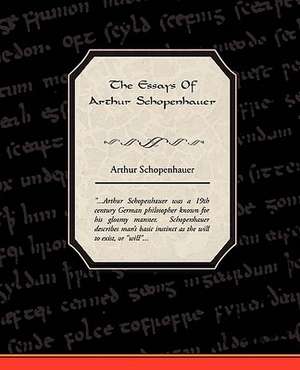The Essays of Arthur Schopenhauer: Its Constitution, Tendencies, and Destiny
Autor Arthur Schopenhaueren Limba Engleză Paperback – 2 aug 2009
| Toate formatele și edițiile | Preț | Express |
|---|---|---|
| Paperback (10) | 44.36 lei 3-5 săpt. | |
| CREATESPACE – | 44.36 lei 3-5 săpt. | |
| CREATESPACE – | 44.36 lei 3-5 săpt. | |
| CreateSpace Independent Publishing Platform – | 45.36 lei 3-5 săpt. | |
| CREATESPACE – | 63.46 lei 3-5 săpt. | |
| CREATESPACE – | 110.52 lei 3-5 săpt. | |
| Book Jungle – 2 aug 2009 | 83.35 lei 6-8 săpt. | |
| TREDITION CLASSICS – 31 oct 2011 | 131.50 lei 6-8 săpt. | |
| Alpha Editions – 5 noi 2020 | 162.96 lei 6-8 săpt. | |
| Blurb – 9 feb 2019 | 191.24 lei 38-44 zile | |
| Blurb – 9 feb 2019 | 201.08 lei 38-44 zile |
Preț: 83.35 lei
Nou
Puncte Express: 125
Preț estimativ în valută:
15.95€ • 16.69$ • 13.27£
15.95€ • 16.69$ • 13.27£
Carte tipărită la comandă
Livrare economică 31 martie-14 aprilie
Preluare comenzi: 021 569.72.76
Specificații
ISBN-13: 9781438522586
ISBN-10: 1438522584
Pagini: 86
Dimensiuni: 191 x 235 x 5 mm
Greutate: 0.16 kg
Ediția:
Editura: Book Jungle
ISBN-10: 1438522584
Pagini: 86
Dimensiuni: 191 x 235 x 5 mm
Greutate: 0.16 kg
Ediția:
Editura: Book Jungle
Notă biografică
Arthur Schopenhauer was among the first 19th century philosophers to contend that at its core, the universe is not a rational place. Inspired by Plato and Kant, both of whom regarded the world as being more amenable to reason, Schopenhauer developed their philosophies into an instinct-recognizing and ultimately ascetic outlook, emphasizing that in the face of a world filled with endless strife, we ought to minimize our natural desires for the sake of achieving a more tranquil frame of mind and a disposition towards universal beneficence. Often considered to be a thoroughgoing pessimist, Schopenhauer in fact advocated ways - via artistic, moral and ascetic forms of awareness - to overcome a frustration-filled and fundamentally painful human condition. Since his death in 1860, his philosophy has had a special attraction for those who wonder about life's meaning, along with those engaged in music, literature, and the visual arts.
